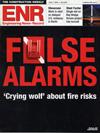Fire-code consultant Richard C. Schulte, an ENR 2004 Top 25 Newsmaker, died on May 11 after a battle with cancer. He was 60 years old.
After the Sept. 11, 2001, terrorist attacks that destroyed New York City’s World Trade Center, the building design and construction community was besieged by calls for terrorist-proof buildings and criticism that the 110-story Twin Towers—not the terrorists—were at fault for the collapses. The critics’ contention, among other things, was that tall buildings were unsafe even in ordinary fires because of poor design and inadequate building and life safety codes.

Schulte used his professional training as a fire-protection engineer, his experience, his research abilities and his impeccable logic to advocate, among other things, that the public was being misled into believing that tall buildings could, and should, be made terrorist-proof and that building codes were inadequate.
“The WTC attacks were ‘kamikaze’ attacks,” said Schulte. “Building codes don’t address kamikaze attacks, nor should they.”
The fire-code consultant became the courageous voice of concerned developers, designers and building-code professionals, who were themselves afraid to speak out against calls for design changes and code reform.
舒尔特(Schulte)是某些人,对他人的英雄,他的声誉是一个正直和强大的原则的人,他们的观点有时与普遍的思想背道而驰。因此,他有时会在消防社区中弄乱一些羽毛。
当他认为一个错误时,他对彻底研究自己的主题保持警惕,然后以无可争议的事实武装,他会写信。他的论点令人信服。
"Rich was, indeed, quite passionate about 'good' fire protection while at the same time speaking out against proposals and actions by some who advocated more and more protection features, and associated costs, without having material benefits," says fire protection engineer Carl F. Baldassarra, a principal at Wiss, Janney, Elstner Associates Inc.
"He was very analytical, well-prepared and a tough advocate for public safety," he adds. "After studying a number of major fire incidents, he offered many thought-provoking comments which were intended to reduce fire fighter deaths and injuries."
Schulte's regular soap box was an unpaid column in Plumbing Engineer. He used it to debunk false statements and expose hidden agendas, especially related to those perceived as opportunists after the 9/11 attacks. “As long as I have documentation, I can say whatever I want,” he said.

美国钢结构研究所(AISC)担心在9/11世界后对高层钢框架和消防安全的强烈反对,分发了2002 - 2003年的Schulte Plumbing Engineer文章的40页重印。这些著作构成了ENR特别报告的骨干,”新利18备用False Alarms," which explored, among other related subjects, the topics of life-safety codes, fire safety, behavior of steel versus concrete structures and fire-protection systems in the post-9/11 world.
由于他对高大的建筑物和消防安全的经过深思熟虑的职位,成为理性的声音并帮助平息抖动的公众,Enr的编辑选择了Schulte作为其中之一新利18备用Top 25 Newsmakers of 2004. In 2006, AISC also honored Schulte with a special achievement award.
Schulte was a 1976 graduate of the Illinois Institute of Technology, with a bachelor of science degree in fire protection and safety engineering and a minor in structural engineering. Until 1988, when he formed Schulte & Associates, he held several positions, including with Schirmer Engineering Corp. From 1988 until 2013, he consulted on scores of projects, including academic campuses, hotels, hospitals, sports facilities and cultural centers.
A frustrated journalist, Schulte wrote more than 250 articles on building fire protection. At his death, he had substantially completed writing "A Brief History of Fire Protection in the United States, 1896-1922." Last year, he said, “The purpose of the book is to develop an understanding of the origins of the fire safety/fire protection provisions included in modern building codes.”
Baldassarra, who worked with Schulte at Schirmer in the 1980s, adds: "Rich was a disciple of many legends in the fire protection engineering profession who set the tone for basic, cost-effective fire protection principles, which have not changed with time."

